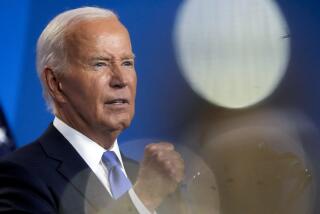Draft Issue Casts Shadows Just as Clinton Seeks Clarity : Democrats: He leads in polls, but questions from Vietnam era are drowning out his message. His need to smooth over conflicts adds to image problem.
- Share via
DENVER — The continuing questions about Democratic presidential nominee Bill Clinton’s Vietnam War draft status have had no measurable effect on his standing in several published polls. But senior campaign aides admit the controversy has had a dramatic impact on Clinton’s campaign at a level polls do not measure: time, attention and focus.
For weeks, concerns over the draft controversy have preoccupied Clinton’s senior advisers, forcing changes in his schedule and often drowning out the themes he would prefer to stress.
Clinton supporters have urged him to stick to his economic message and avoid being distracted by the draft controversy. When Clinton met here Thursday with Western Democratic governors, several of the participants stressed that advice, Colorado Gov. Roy Romer later told reporters.
But the distraction has been inevitable and has come at a particularly bad time for Clinton. He continues to lead President Bush by wide margins in the polls--indeed some have shown the margin widening recently. But the campaign’s own polls corroborate what reporters have found in interviewing voters: Clinton has profited by widespread public rejection of President Bush but has not yet established a deeply committed following of his own.
To change that fact, Clinton strategists had hoped to use this period of the campaign to stress their candidate’s program, finding ways to communicate to voters what it is that Clinton stands for. But it is precisely that effort which often has been stymied by the draft controversy.
“We’ve punched through on some issues,” said Clinton policy director Bruce Reed. But, he conceded, the time spent worrying about the draft issue has carried “an opportunity cost.”
Campaign strategists recognize two problems that flow from the voters’ still-sketchy knowledge of Clinton’s program. First, support built on rejection of one’s opponent tends to be soft and could turn if Republican attacks take hold. Second, even if Clinton’s lead holds steady and he wins, a lack of public understanding of his ideas could translate into a lack of support for them once the inevitable battles with Congress begin after the inauguration.
“It’s frustrating to him,” said one campaign aide. “He wants to be able to claim a mandate.”
On Wednesday in Los Angeles, Clinton succeeded in staging an event to highlight the urban aid and community development portions of his economic plan. But the day before, when he planned to release a new policy statement outlining his plans for a partnership between business and government to promote America’s high-technology industry, the draft issue drowned him out.
The technology policy, and accompanying endorsements from several prominent Bay Area computer industry executives, had been in the works for several weeks and was supposed to be a highlight of Clinton’s West Coast campaign swing. But worries about the draft issue prompted Clinton to fly to Salt Lake City, where he and Bush spoke back-to-back to a National Guard Assn. convention. By the time Clinton arrived in San Jose for his technology policy announcement, it was too late for the event to receive any attention on national television news programs.
A second, and related, problem is that the attacks--coupled with his lead in the polls--seem to have heightened Clinton’s ingrained caution and desire to smooth over controversies.
Senior Clinton aides believe one major factor in his success has been Clinton’s ability to convince the public that he is a “different kind of Democrat”--one unlike some past party leaders who seemed always willing to promise each constituency group whatever it wanted to hear. Unlike other Democrats, his aides said, Clinton would show some hard edges.
But throughout the campaign, Clinton’s desire to display an edge has been at war with his deep-seated desire to build consensus and accommodate differences.
At times in his campaign, he has shown a willingness to take politically difficult stands--defending his free-trade beliefs in front of an audience of union political activists during the early days of the primary campaign, for example. But at other times, when he has been under stress--during the New York primary in April, for example, and during the weeks before the California primary in June, when the Ross Perot boom was at its height--the accommodationist side of his nature has won out.
In the last few weeks, that part of Clinton’s personality has again come to the fore. On Monday, for example, he addressed a large rally in Portland, Ore., telling his audience that he was “pro-growth and pro-environment . . . pro-business and pro-working families.”
The line surprised aides, who thought they had persuaded the candidate to stop using that line, which he first unveiled during the California contest. Campaign focus groups have shown that voters react negatively to that statement, feeling that Clinton is trying to be all things to all people.
Another example of his desire to avoid giving offense to any voting group came just a few hours after the Portland rally. Asked by a local reporter about his position on a controversial anti-gay rights ballot measure in Oregon, Clinton expressed disapproval. “I think it’s basically a divisive measure,” he said. “My own view is that this should be a country that is free of discrimination.”
But, he quickly added, “I don’t think there should be affirmative steps to promote the homosexual lifestyle.”
More to Read
Get the L.A. Times Politics newsletter
Deeply reported insights into legislation, politics and policy from Sacramento, Washington and beyond. In your inbox twice per week.
You may occasionally receive promotional content from the Los Angeles Times.









